- Learning time
- 60 minutes
- First play time
- 180 minutes
Clans of Caledonia
Designed by: Juma Al-JouJou
In Clans of Caledonia you are the leader of one of the clans at the time when Scotland was beginning to industrialize – and whoever best oversees their clans transition through this historic upheaval will be the winner of the game.
The board itself shows the lands you will be developing, and in front of you you have your own personal player board, populated with wooden pieces – sheep, cows, milk, wheat, bread, cheese, whisky, and last but not least, woodcutters and miners. Also on the table is the market, and an export board where you can collect orders to fill. The main thrust of the game is gathering and filling these orders, but there’s quite a bit going on around that. Before play begins, everyone puts two of your workers (the woodcutters/miners) on the board, and on your turn you can expand from their locations by adding one of your pieces – placing a cow will get you milk, sheep will get you wool, and planting crops will get you wheat, placing workers will get you more cash: basically, whatever spaces you reveal on your personal board defines what income you get at the end of each round. By expanding you can also process these basic ingredients into bread/cheese/whisky at the end of the round, and use these to fill the orders. If the order calls for beef or mutton, then you can only fill it by slaughtering the animals you have on the main board and returning them to your personal board – which means you’re depriving yourself of wool or milk!
The orders themselves do up to three things: they advance the proliferation of imported goods (tobacco, cotton and sugar cane), as well as giving you points at the end of the game. Often there will be a little bonus as well, such as money or a cheap expand or upgrade move. Because money is also crucial in this game – taking orders gets increasingly expensive, and there is an often exorbitant cost to expanding on the central map. But you need to expand, because without doing so, you’re not gaining the benefits you need to fill the precious orders!
There are other things to consider too – such as how many times you can buy or sell goods at the market: you start with two traders, but can pay for more during play. Buying forces the price of a resource up, whereas selling lowers it. You can increase your ability to expand on the board by improving your shipping capacity – to cross rivers, and then lochs. But the main focus is on the orders themselves, and how they affect the imported goods. At the end of the game you score points from your completed orders relative to how much a good has been imported – the most commonly seen scores three points, whereas the scarcest 5points. This can be a huge swing! Points are also scored from your accumulated goods and how many settlements you have on the board within shipping distance of each other. And that, in a nutshell (…see Sam Says below) is Clans of Caledonia!
Except for one more thing… each player represents a Clan, of course, and each clan has its own special advantage over the others. The game comes with several but your strategies can vary from game to game as you play the different clans and attempt to utilize their strengths.
The guru's verdict
-
Take That!
Take That!
It's not a game with a huge amount of direct interaction, but you can certainly see what strategies your opponents are employing and stymie them by taking the (in)appropriate order that they clearly want for themselves.
-
Fidget Factor!
Fidget Factor!
On a first play, there is a huge amount to think about in how all the cogs fit together - or could do. Subsequent plays will see this drop substantially though, as you get your head around the idiosyncrasies of what is basically a collect-and-deliver game.
-
Brain Burn!
Brain Burn!
Familiarity helps, but there are a lot of options here: trade, export, expand, improve shipping, hire a trader, upgrade... it's never going to be a game replete with hilarity because it's more of a puzzle of engineering - you need to optimize your turns to suit an overall strategy, and the variables in set up and play can change a lot from game to game.
-
Again Again!
Again Again!
Huge. The main board is modular so can be set up a number of ways. Different clans suggest different avenues of pursuit. And we didn't even mention the ports (four uses per game at most!) or the round by round scoring opportunities, both of which are randomized for each game you play. If you enjoy Clans there is endless replayability here.

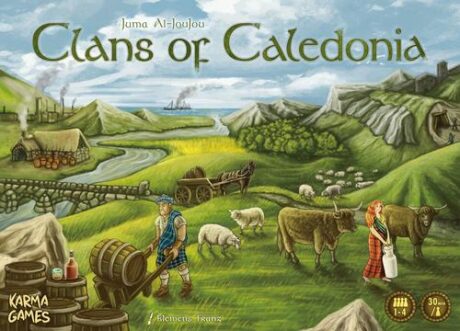
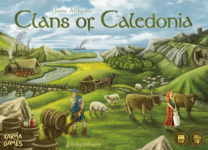
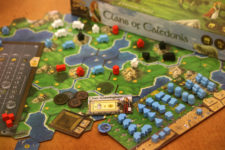
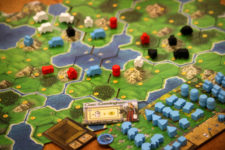
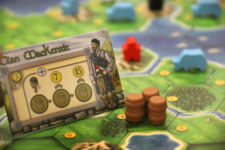
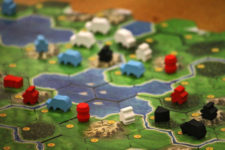


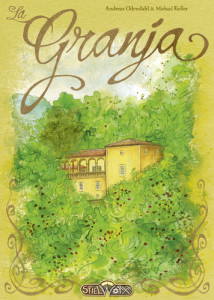
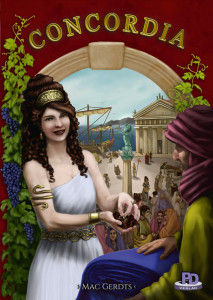
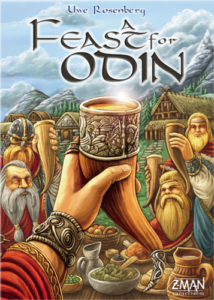
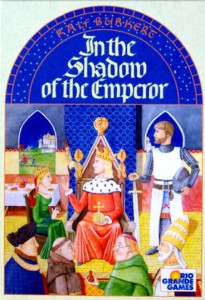
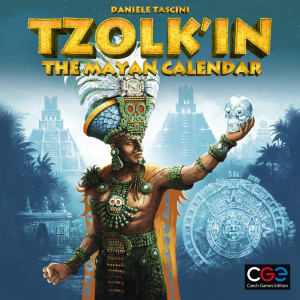
Sam says
...except of course Clans of Caledonia isn't really the sort of game one can describe 'in a nutshell'. We've given the barest overview here, but there's some other stuff going on. But like many of these 'big games' - albeit this one comes in a smallish box - there is a simple idea at its heart: gather resources, deliver them. But whilst anyone can slaughter a cow, you need processing abilities to turn milk into cheese and wheat into bread or whisky. You can't simply expand whenever you feel like it, because you need cash and it can be hard to come by. So the game is about striking a balance between long-term strategies and round-by-round demands. It's not one for young families or players who want a boisterous luck-fest like Midnight Party - this is a game for those who like the cerebral challenge of building their 'engine' and making it run. As such, it's a delight.